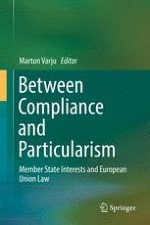2019 | OriginalPaper | Buchkapitel
EU Loyalty and the Protection of Member States’ National Interests
A Mapping of the Law
verfasst von : Federico Casolari
Erschienen in: Between Compliance and Particularism
Verlag: Springer International Publishing
Aktivieren Sie unsere intelligente Suche, um passende Fachinhalte oder Patente zu finden.
Wählen Sie Textabschnitte aus um mit Künstlicher Intelligenz passenden Patente zu finden. powered by
Markieren Sie Textabschnitte, um KI-gestützt weitere passende Inhalte zu finden. powered by
